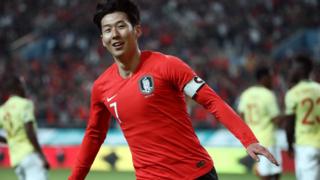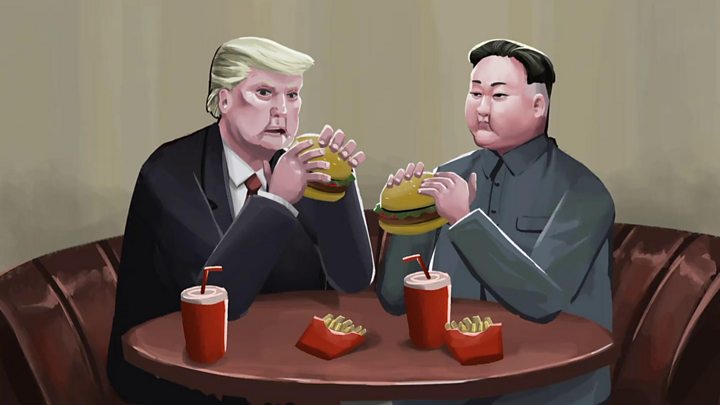Welcome to the world’s strangest football derby
On Tuesday, North and South Korea are set to play a football derby like no other.
It’s rare for the two sides to face off – and almost unheard that they play in the North’s capital, Pyongyang.
But there will be no live broadcast, no fans from the South, and no foreign media at all in the stands.
Ties between North and South are currently at a low after some progress in 2018 – in which sports partly broke the ice.
“Football is the most popular spectator sport in North Korea and sports are hugely important for the North,” Andray Abrahamian, Senior Adjunct Fellow at the Pacific Forum, told the BBC.
“It provides a focal point for pride and patriotism. In a sense, it’s pretty similar to how other countries use sports for social purposes.”
Kick-off between the two men’s national teams will be in the early evening, but if you want to follow the match, you’ll have a hard time.
Apart from the fact it isn’t being broadcast live, even international tourists currently in North Korea won’t be allowed to watch the game.
How unusual is a N Korea – S Korea match?
It’s rare but it happens: Both countries are members of Fifa and that means they occasionally play each other in international competitions.
This time, it’s a qualifier for the 2022 Qatar World Cup that has brought them together.
But what’s even rarer is that Tuesday’s match takes place in North Korea.
In most past cases, games were held either in the South, or in a third country.
The two sides are technically still at war – the Korean War ended in 1953 with an armistice, but a peace treaty was never signed.
The only time a South Korean men’s squad played in Pyongyang was a friendly in 1990.
The women’s teams have also only played once in the North, for a 2017 qualifier for the Asian Cup the following year.
All other women’s matches were held either in the South or a third country.
Which side are the favourites?
For the men’s sides, the odds are clearly with the South.
The team has won or drawn at almost every fixture since the first matches in the late 1970s, with the 1990 friendly in Pyongyang being the only time the North won the day.
Given the South is ranked 37 in the world compared with the North at 113, you might expect South Korea to win this one as well.
Yet both teams are level at the top of their qualifying group, having each won their previous two games.
Each side have one clear star player: for the South that is Tottenham’s Son Heung-min while North Korea have recent Juventus signing Han Kwang-ong as their key player.
North Korea has the home advantage though – there will be not a single South Korean fan in the stadium.
It’s not even clear whether there will be any normal spectators at all. Talking to the reporters on the way to Pyongyang, South Korean players appeared to expect an empty stadium.
“It’s much better to play in a packed stadium rather than an empty one, but I think we’ll be able to play a good match if we use it as motivation,” defender Kim Min-jae told AFP ahead of the match.
For the women’s team, the stats are almost an exact inversion of the men’s.
The South has won only once. All other matches were either a draw or won by the North.
What’s the state of North-South relations?
The match comes as relations between Seoul and Pyongyang hit something of a low.
The North is upset that South Korea continues to carry out low-level military exercises with the US, and earlier this summer rejected all further talks with Seoul.
The North’s denuclearisation talks with the US have just again hit a roadblock, and relations with the South tend to ebb and flow alongside such talks.
Pyongyang also recently tested a new missile, in a significant advance on earlier tests, increasing tension with Washington.
But the ups and downs of North-South relations are not usually reflected in the sporting rivalry.
“The people I’ve talked to about this in both Koreas generally seem quite supportive of athletes from the other side,” says Mr Abrahamian.
“They’re pleased to see Koreans doing well on the world stage, whatever country they’re from.”
Sports diplomacy to the rescue?
Sport has often been a key to unlocking fresh diplomacy on the peninsula.
The 2018 thaw came about when North Korea’s Kim Jong-il floated the idea his country could take part in the Winter Olympics in the South.
Months later, the two teams marched under a common flag, participated together and even fielded a joint women’s ice hockey team.
The same feat was repeated at the Asian Games when a unified Korea boating team won a historic gold medal.
With the mood in Pyongyang notoriously unpredictable, it is hard to say whether Tuesday’s soccer game might again pave the way for fresh diplomacy.
In September, North and South agreed they will seek to co-host the 2032 Summer Olympics.
In the lead-up to the World Cup qualifier, relations remained very tense.
The South had hoped to be able to send fans to the match – but was denied. And Seoul offered to organise the broadcasting of the match – an offer also turned down.
This time, it doesn’t look as if Pyongyang is looking for the match to be a tool to bridge the strained political relationship,” Mr Abrahamian explains.
“Pyongyang has been giving Seoul the cold shoulder for most of this year and that probably won’t change unless the US and North Korea find a breakthrough.”
Source: Read Full Article




